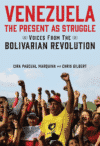Revolutions

Karl Marx saw the ruling class as a sorcerer, no longer able to control the ominous powers it has summoned from the netherworld. Today, in an age spawning the likes of Donald Trump and Boris Johnson, our society has never before been governed by so many conjuring tricks, with collusions and conspiracies, fake news and endless sleights of the economic and political hand. And yet, contends Andy Merrifield, as our modern lives become ever more mist-enveloped, the works of Marx can help us penetrate the fog. In Marx, Dead and Alive—a book that begins and ends beside Marx’s recently violated London graveside—Merrifield makes a spirited case for a critical thinker who can still offer people a route toward personal and social authenticity. | more…

Venezuela has been the stuff of frontpage news extravaganzas, especially since the death of Hugo Chávez. With predictable bias, mainstream media focus on violent clashes between opposition and government, coup attempts, hyperinflation, U.S. sanctions, and massive immigration. What is less known, however, is the story of what the Venezuelan people—especially the Chavista masses—do and think in these times of social emergency. Denying us their stories comes at a high price to people everywhere, because the Chavista bases are the real motors of the Bolivarian revolution. This revolutionary grassroots movement still aspires to the communal path to socialism that Chávez refined in his last years. Venezuela, the Present as Struggle is an eloquent testament to their lives. | more…

In the twenty-first century, all signs are pointing to another period of hegemonic struggle over the world economy, this time between the United States and China, although complicated in this case by the unique, indeterminate aspects of the post-revolutionary Chinese social formation, which is neither entirely capitalist nor entirely socialist. | more…

Quiet as it’s kept inside the United States, the Cuban revolution has achieved some phenomenal goals, reclaiming Cuba’s agriculture, advancing its literacy rate to nearly 100 percent—and remaking its medical system. Cuba has transformed its health care to the extent that this “third-world” country has been able to maintain a first-world medical system, whose health indicators surpass those of the United States at a fraction of the cost. Don Fitz combines his broad knowledge of Cuban history with his decades of on-the-ground experience in Cuba to bring us the story of how Cuba’s health care system evolved and how Cuba is tackling the daunting challenges to its revolution in this century. | more…

Mike Gonzalez’s new biography of JosŽ Carlos Mari‡tegui is an important attempt to introduce the Peruvian socialist to an English-speaking audience. It constitutes not so much a rediscovery of Mari‡tegui, but is itself part of a slow but steady embrace of a novel and innovative thinker broadly credited with the creation of a Latin American Marxism. | more…

On a grey winter morning in Seattle, in February 1919, 110 local unions shut down the entire city. Shut it down and took it over, rendering the authorities helpless. For five days, workers from all trades and sectors – streetcar drivers, telephone operators, musicians, miners, loggers, shipyard workers – fed the people, ensured that babies had milk, that the sick were cared for. They did this with without police – and they kept the peace themselves. This had never happened before in the United States and has not happened since. Those five days became known as the General Strike of Seattle. | more…

Monthly Review and Monthly Review Press author, world socialist activist, and theorist of revolution, Marta Harnecker, died on June 15, 2019, at age 82. In her memory, we republish an exchange between her and Greek journalist Tassos Tsakiroglou, conducted in advance of the 2017 conference on 150 Years of Marx’s Capital: Reflections for the Twenty-First Century. | more…

For over a century, Karl Marx’s critique of capitalism has been a crucial resource for social movements. Now, recent economic crises have made it imperative for us to comprehend and actualize Marx’s ideas. But without a knowledge of Karl Marx’s life as he lived it, neither Marx nor his works can be fully understood. There are more than twenty-five comprehensive biographies of Marx, but none of them consider his life and work in equal, corresponding measure. This biography, planned for three volumes, aims to include what most biographies have reduced to mere background: the contemporary conflicts, struggles, and disputes that engaged Marx at the time of his writings, alongside his complex relationships with a varied assortment of friends and opponents. | more…

The world is burning, flooding, and politically exploding, to the point where it’s become abundantly clear that neoliberal feminism—the kind that aims to elect The First Woman President—will never be enough. In her vibrant, politically personal essay, Zillah Eisenstein asks us to consider what it would mean to thread “socialism” to feminism; then, what it would mean to thread “abolitionism” to socialist feminism. Finally, she asks all of us, especially white women, to consider what it would mean to risk everything to abolish white supremacy, to uproot the structural knot of sex, race, gender, and class growing from that imperial whiteness. | more…

These are uncertain times in Latin America. Popular faith in democracy has been shaken; traditional political parties and institutions are stagnating, and there is a growing right-wing extremism overtaking some governments. Yet, in recent years, autonomous social movements have multiplied and thrived. This book presents voices of these movement protagonists themselves, as they describe the major issues, conflicts, and campaigns for social justice in Latin America today. | more…

The presidential elections in Cuba in March 2018 has raised again the question of the country’s survival. How can Cuba hold up and develop against the economic, cultural, and military encirclement of U.S. imperialism in particular and the capitalist system in general? An answer can be sought in the history of Cuba’s socialist transition, the unique role played by Che Guevara, and the emergence of ideas regarding the possibility (and impossibility) of achieving socialism in one country alone. | more…

Although the 1967 revolutionary armed peasant uprising in Naxalbari, at the foot of the Indian Himalayas, was brutally crushed, the insurgency gained new life elsewhere in India. In fact, this revolt has turned out to be the world’s longest-running “people’s war,” and Naxalbari has come to stand for the road to revolution in India. What has gone into the making of this protracted Maoist resistance? Bernard D’Mello’s fascinating narrative answers this question by tracing the circumstances that gave rise to India’s “1968” decade of revolutionary humanism and those that led to the triumph of the “1989” era of appallingly unequal growth condoned by Hindutva-nationalism, the Indian variant of Nazism. | more…











